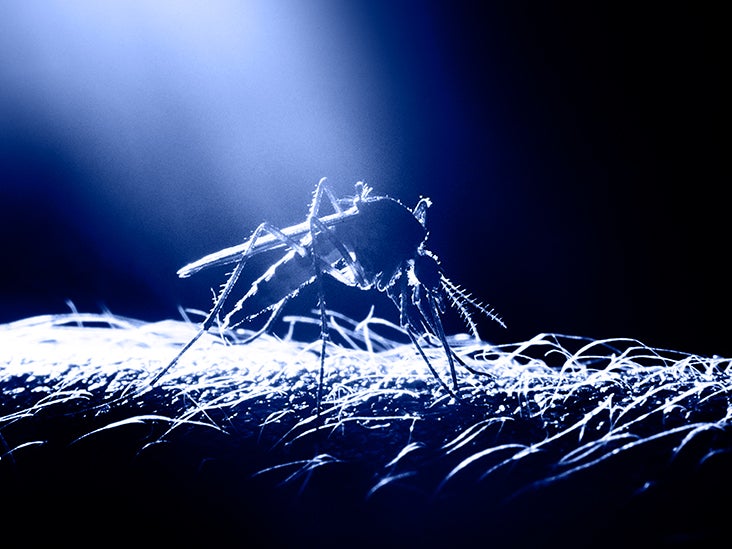What is West Nile virus and can it cause meningitis? - Medical News Today

West Nile virus (WNV) is a mosquito-borne virus. People can contract the virus through a bite from an infected mosquito. WNV may cause mild symptoms in most cases. In some cases, it can cause a more serious illness, such as meningitis.
Mosquitos can carry WNV and pass it on to humans through a mosquito bite.
WNV may cause no symptoms in some people, while others may experience mild, flu-like symptoms. In severe cases, WNV may lead to more serious conditions, such as meningitis or encephalitis.
This article looks at what WNV is, how it may occur, symptoms to look out for, and treatment.
WNV is a mosquito-borne virus. WNV can infect humans through a bite from a mosquito carrying the virus.
WNV can occur in certain climates during mosquito season, such as late summer to early fall in mild areas and year-long in southern areas.
WNV usually causes mild symptoms similar to the flu. In some cases, WNV can cause serious illnesses, such as meningitis.
A mosquito can contract a WNV infection from feeding on birds who have the infection. Mosquitos can then pass on WNV if they bite humans or other mammals.
A bite from an infected mosquito is the
- exposure to WNV in a laboratory
- blood transfusion
- organ transplant
- a pregnant person to their baby, either during pregnancy, delivery, or breastfeeding
WNV does not spread through any of the following:
- coughing or sneezing
- human contact
- handling birds with WNV, either dead or alive
- touching live animals
- eating an animal with WNV
In some cases, WNV can cause meningitis, which is an inflammation of the lining of the brain and spinal cord.
WNV can also cause encephalitis, which is an inflammation of the brain, or meningoencephalitis, which is an inflammation of the brain and surrounding membranes.
If the virus crosses the blood-brain barrier, which helps to protect the central nervous system, it can cause inflammation in the meninges, which are layers of membrane protecting the brain and spinal cord.
According to the Centers for Disease Control and Prevention (CDC),
The CDC states that
- fever
- headache
- body aches
- joint pain
- vomiting
- diarrhea
- rash
- fatigue
- weakness
In a few people, roughly
- high fever
- headache
- neck stiffness
- stupor, which includes impaired consciousness, extreme lethargy, or decreased response to external stimuli
- disorientation
- coma
- tremors
- convulsions
- muscle weakness
- vision loss
- numbness
- paralysis
A doctor may first take a medical history and assess any symptoms.
To diagnose WNV, a doctor may take a lumbar puncture. A doctor will insert a needle into the spinal canal to take a sample of cerebrospinal fluid. They may also take blood tests to check for the presence of WNV.
A doctor can then send the samples to a laboratory to check for WNV antibodies, which
Viral culture tests may also help to diagnose WNV from the sample fluid. Doctors can also do reverse transcription-polymerase chain reaction (RT-PCR) and immunohistochemistry (IHC) tests to help with the diagnosis.
WNV can cause severe illness in anybody, but people
People are also at higher risk of severe illness from a WNV infection if they have certain medical conditions, including:
- cancer
- diabetes
- high blood pressure
- kidney disease
- an organ transplant
There are currently no vaccines or specific medications to treat WNV. To treat mild symptoms, people may take over-the-counter pain relief medication.
Some people who have a fever and other symptoms, such as headache and body aches, will make a full recovery but may still have fatigue or weakness for
To treat a severe illness from WNV, such as meningitis, people may require treatment in a hospital, which may include:
- intravenous fluids
- pain medication
- respiratory support if necessary
- prevention of secondary infections
Some people may recover from viral meningitis in 5–14 days without needing any medical treatment.
Complications of WNV can include:
- encephalitis
- meningitis
- meningoencephalitis
Healthcare professionals may refer to these as West Nile neuroinvasive disease (WNVD).
People will need to seek immediate medical attention if they have the
- high fever
- headache
- neck stiffness
- stupor
- disorientation
- tremors
- convulsions
- muscle weakness
- paralysis
People with WNVD may also experience coma, which will require immediate emergency medical treatment.
According to the
- using insect repellent, such as DEET or a repellent approved by the Environmental Protection Agency
- spraying repellent on any exposed skin but not on the skin underneath clothing
- applying repellent after applying any other products, such as sunscreen
- wearing long sleeves and pants
- treating clothing with an insecticide, such as 0.5% permethrin
- using mosquito screens over doors and windows
- if possible, using air conditioning
- using mosquito nets treated with permethrin over beds where necessary
- emptying any stagnant water once a week
If people have mild symptoms of WNV, they may be able to treat the virus at home with rest and pain relief medication.
People will need to contact a doctor right away if they have symptoms of
- high fever
- headache
- neck stiffness
- disorientation
- stupor
- tremors
- convulsions
- muscle weakness
- numbness
- vision loss
- paralysis
- coma
WNV is a mosquito-borne virus. Mosquitos carrying the virus can pass it on to humans through a mosquito bite.
In most cases, people may not experience any symptoms from WNV. Some people may experience mild, flu-like symptoms, such as fever.
In severe cases, the virus can cross the blood-brain barrier and cause serious illness. WNV can cause meningitis, encephalitis, or meningoencephalitis.
If people have any severe symptoms, such as neck stiffness, muscle weakness, or high fever, they will need to seek medical help right away.
Comments
Post a Comment